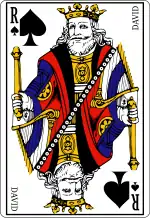Coucou
Coucou, also called As Qui Court or Hère, is an historical French card game that uses a pack of 32 or 52 cards and is played by five to twenty players. It had the originality of being played with only one card in hand. As a shedding game, there was only one winner who may claim the stakes if there are any.
 Coucou ! | |
| Origin | France |
|---|---|
| Alternative names | As qui court, Hère |
| Type | social game, game of chance |
| Family | Cuckoo group |
| Players | 5 – 20 |
| Age range | 6+ |
| Cards | 32 or 52 |
| Deck | Piquet or standard pack |
| Play | Anticlockwise |
| Card rank (highest first) | K Q J 10 9 8 7 (6 – 2) A |
| Playing time | 10 – 45 minutes |
| Related games | |
| Chase the Ace, Cuccú, Gnav, Hexenspiel, Kille, Ranter-Go-Round | |
History
The earliest reference to the game dates to 1490 France where it was known by the name of Mécontent (Malcontent) and was played with a standard 52-card deck.[1] The first rules appear under the name Here in 1690[2] and under Coucou in 1721.[3] The name As Qui Court appears in the mid-19th century, but the name Coucou ("cuckoo") persisted and the game is still played in France today under that name. The game had migrated to England by 1881 as Ranter-Go-Round,[4] but is now also known as Cuckoo.
Cards
If five or six played, a 32-card pack was used; if more played, a 52-card pack is used. Suits were not relevant; only the card ranks were important. Regardless of whether the 32 or 52 cards were used, the lowest card was always the Ace and the highest the King. Thus, with 32 cards the Seven ranked just above the Ace.
Deal
The first dealer of the game was determined by lots as agreed between the players. He dealt, in an anti-clockwise direction starting with the player on his right, one card to each player and three to himself, which was an advantage to the dealer.
After consulting his three cards, the dealer kept the highest and put the other two, face down, under the talon. He then placed the talon between him and the player on his right, who would become the next dealer.
At this point, all players had only one card in their hand.
Play
Each player viewed his card, then eldest hand (the player to the right of the dealer), started playing.
He could decide to keep the card in hand if he thought its value was high enough. In this case he announced: "I keep", and play passed to the player to his right. If, on the other hand, he considered its value too low, he could exchange it with his right-hand neighbour, announcing: "I exchange". The neighbour could not refuse the exchange unless he was hiding a King, in which case he did not show it but announced "Cuckoo!" to the first player, who had to then keep his card. If the neighbour did not say "Cuckoo", both players exchanged their cards.
Each player, in turn, exchanged with his right-hand neighbour. The last player, the player to the left of the dealer, did not exchange his card with the dealer, but with the card on top of the talon. If the latter turned out to be a King, he could not exchange it but had to keep his card.
The dealer was obliged to keep his card, having taken advantage of the privilege of choosing from his initial three cards at the time of the deal.
The exchanges being thus finished, all revealed their cards and the loser of the deal was the player or players with the lowest card or cards.
Chips
At the start of the game, players were each given the same number of chips, for example, five.
At the end of each deal, the loser(s) deposited one of their chips in a basket. When a player had used up his or her chips, he or she had to withdraw from the game and was eliminated. The number of players taking part in the game thus decreased as the game progressed, except in the case where all players had the same card rank.
Winning
The game ended when only one player remained in the game, all the others having been eliminated. He then won the game and swept the agreed stake.
If the game was played for stakes, each player at the beginning of the game anted an agreed stake in a basket. The pool thus formed became the stake that the winner would win. The larger the number of players at the start of the game, the higher the amount at stake, which meant that in "Cuckoo" the winner usually won a significant amount, while each of the other participants only lost a relatively small amount.
The low financial risk and the simplicity of the game led Lebrun (1828) to classify Coucou as a "game of entertainment".[5]
Duration
The duration of the game depended partly on how quickly each deal was played and partly on how many players there are. In the literature, for example, there is mention of a game lasting three quarters of an hour.
Other names
As Qui Court
The name 'As Qui Court' ("Running Ace", lit. "the Ace that Runs") is later than Coucou and only appears in the literature around the middle of the 18th century. It is so named because the Ace, as the lowest card, is passed from hand to hand until it returns to the talon unless a King blocks it on the way.
According to Méry (1847), the only difference between As Qui Court and Coucou is that a player who holds a King in his hand may refuse the exchange as in Coucou, but instead of announcing "Cuckoo!", he reveals his King. However, Méry's rules for As Qui Court also contain the following three significant differences from the rules of Coucou given in L'Académie des jeux compendia published during the 18th century and the rules according to Lacombe (1792):[6]
- the dealer takes only one card instead of three;
- the player to the left of the dealer exchanges with the dealer;
- the dealer can only exchange his card with the talon and only if he has received an Ace from the previous player - being the dealer is now a disadvantage,
Hère
While the name Coucou remains the one adopted by the reference works of the 18th century – the Académie universelle des jeux and Dictionnaire des jeux – the Académie française dictionary never mentions it, preferring instead the name 'Hère'.
According to Lalanne, it is impossible to determine with any certainty whether the "type of card game" mentioned under the name Hère in the first edition of Académie française dictionary in 1694, refers to Coucou or another game, because of a lack of detail.[7] In the 1721 edition of La Plus Nouvelle Académie Universelle des Jeux, the card game called Hère does not correspond in any way to Coucou, but rather to a game of combinations possibly similar to modern poker.[8] This Hère disappears in the 1725 edition of the Académie universelle des jeux, and Coucou makes its appearance there. On the other hand, the fourth edition of the same dictionary, in 1762, partly removes the ambiguity by specifying that Hère refers to a card game where only one of the players wins. The fifth edition of 1798, taking up the previous definition, says "This game is also called As Qui Court."
Meanwhile Furétiere, in the 1690 edition of Dictionnaire Universel, gives a brief description of Here as a game in which each person is given only one card and may exchange it with his or her neighbour; the player ending up with the lowest card losing the deal. Here is also the name of an Ace left in a player's hand causing that player to lose the deal. it is described as "the game of fathers, because they play it even with the smallest children."[9]
Lebrun (1828) does not describe L'As Qui Court but simply Coucou with traditional rules. In a footnote, the author points out that Coucou is also called Her, specifying that when a player receives a King instead of saying "Cuckoo!", he announces "Her!"[10]
References
- Depaulis, Thierry (1981). "Quand le Cuccu est Mécontent". L'As de Trèfle. 11: 23–24.
- Furetière 1690.
- Greco & Bellecour 1721, pp. 199–201.
- Cassell's Book of In-Door Amusements, Card Games and Fireside Fun 1881, p. 125.
- Lebrun 1828, pp. 278 and 288-289.
- Lacombe 1792, p. 41.
- Le dictionnaire de l'Académie française 1694, p. 560.
- Greco & Bellecour 1721, pp. 186-188.
- Furétiere 1690.
- Lebrun 1828, pp. 288-289.
Bibliography
- _ (1694). Le dictionnaire de l’Académie française.
- _ (1762). Dictionnaire de l'Académie française. 4th edn. Vol. 1. A-K. Paris: Bernard Brunet. p. 872.
- _ (1792). Dictionnaire de l'Académie française. 5th edn. Vol. 1. A-K. Paris: Bossange. p. 685.
- _ (1799). Dictionnaire de jeux mathématiques. Paris: Agasse. p. 414.
- _ (1881). Cassell's Book of In-Door Amusements, Card Games and Fireside Fun. Cassell.
- Greco, Gioachino and Abbé Bellecour (1721). La plus nouvelle académie universelle des jeux, Vol. 1. Leide: van der Aa.
- Lacombe, Jacques (1792). Dictionnaire des jeux, Paris: Panckoucke.
- Le Gras, Théodore (1725). Académie universelle des jeux, Paris.
- Lebrun, M. (1828), Manuel des jeux de calcul et de hasard, Paris: Roret.
- Méry, Joseph (1847). L'Arbitre des jeux, Paris, Gabriel de Gonet.
External links
- Le Coucou. Translation and adaptation of English article pagat.com (2017).
- Cuckoo at pagat.com.

